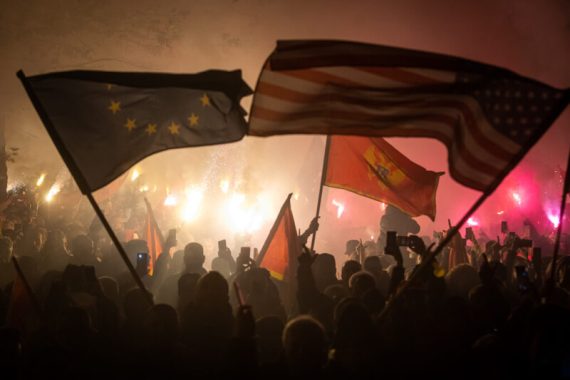M
ilo Djukanovic and his party Democratic Party of Socialists (DPS) were in power in Montenegro for 30 years. Opinions about him are divided with some people viewing him as a strong and capable leader who modernized Montenegro and brought it closer to the West, and others of the opinion that he is an authoritarian figure who has undermined democracy and allowed corruption and organized crime to flourish. The fact remains, however, that since 2020 his grip on power has weakened for several reasons.
Montenegro has faced economic challenges in recent years, including high levels of debt and unemployment. The DPS’s handling of the issues was seen by some as inadequate, leading them to look for a party with fresh ideas and solutions. Additionally, Djukanovic faced criticism over his handling of the economy. Montenegro was hit hard by the COVID19 pandemic, and the government’s response was seen by some as inadequate.
Djukanovic’s government faced protests in 2020 over a controversial law on religious freedom which was viewed by a section of the population as an attack on the Serbian Orthodox Church.
Djukanovic was also criticized for his alleged involvement in corruption and was accused of undermining the country’s democratic institutions and norms. His popularity has waned in recent years, and many Montenegrins have grown tired of his long tenure in power.
As a result, the DPS lost power in the August 2020 parliamentary elections for the first time since Montenegro gained independence in 2006. The opposition parties united against the DPS and a coalition government led by the pro-Serbian “For the Future of Montenegro” was formed. This was followed by intra-governmental crises and changes.
Due to a combination of factors, including corruption, identity politics, economic issues, voter fatigue, and the rise of a strong opposition coalition, Djukanovic lost the presidential office in 2023. While Djukanovic remains an influential figure in Montenegrin politics, his grip on power is no longer as strong as in the past.
Jakov Milatović’s victory and Montenegro’s generational shift
Jakov Milatović entered politics in 2020 after completing his education in the UK and U.S. Between 2020 and 2022, Milatović was economy and development minister. He is considered one of the rising stars of Montenegrin politics and has been described as a competent and ambitious politician.
Together with former finance minister Milojko Spajić, Milatović founded the centrist Europe Now Party and became one of its candidates in 2022. He won the presidential runoff against Djukanovic on April 2 with around 59% of the votes.
Milatović’s victory indicates the continuation of the generational shift in Montenegrin politics that began in 2020. Current prime minister Dritan Abazović and Milatović belong to the same generation and are reputed technocrats with degrees from Western universities.
Djukanovic’s term expires on May 21. Parliamentary elections will be held on June 11, 2023 in which the parliamentary distribution of the DPS and the opposition is very important to forecast this small country’s domestic and foreign policy.
Djukanovic’s defeat brings potential changes to Montenegro
Djukanovic has been the dominant political figure in Montenegro for several decades, and his rule has been characterized by a pro-Western foreign policy orientation. There is no doubt that there will be significant changes in both Montenegro’s foreign and domestic policy following Djukanovic’s defeat.
In terms of foreign policy, a new president may take a different approach to Montenegro’s relationship with the West, particularly with regard to the country’s NATO membership and its aspirations for EU membership.
Djukanovic has been a strong advocate of Montenegro’s integration into these organizations, and his government has implemented numerous reforms in order to meet the standards required for membership. During his long term, accession negotiations with the EU began in 2012 and entry to NATO was finalized in 2017.
Russia is among Montenegro’s biggest trading partners, investors, and tourist sources, but the political relationship has been complicated due to the balance strategy between Russia and the EU. Djukanovic has controversially close personal ties with Serbian President Aleksandar Vučić who has a strong relationship with Russian President Putin.
As a result, some Montenegrin citizens and political groups have been critical of these efforts. Concerns regarding Djukanovic were also present in the annual European Progress Reports.
Milatović has promised to guide Montenegro towards its accession to the European Union in the following years, to balance relations with Montenegro’s neighbors and supporters, and to continue to be a reliable partner and NATO ally. Djukanovic has generally been wary of Russia’s influence in the Balkans and has sought to maintain a balance between the East and West. The new president will be expected to strike such a balance with a new approach.
It seems that one of Milatović’s main objectives and a key foreign policy priority for Montenegro will be to expedite the country’s accession to the EU, with the hope of becoming a member within his tenure.
In terms of domestic policy, Milatović may try to prioritize different issues and pursue different policies than Djukanovic. For example, Milatović may prioritize tackling corruption and improving the country’s democratic institutions, which have been the subject of criticism under Djukanovic’s rule. He may also prioritize economic policies that prioritize social welfare and address inequality.
Recommended
The challenge is that Milatović has not addressed sensitive topics like the national identity of Montenegrin citizens, relations with Serbia, or the role of the Serbian Orthodox Church in Montenegro. He mostly focuses on the EU, economy, and corruption. This has been creating doubts about his person and his ability to rebuild the country.
Overall, it is difficult to predict exactly how Montenegro’s foreign and domestic policies would change after Djukanovic. The role of the president of Montenegro comes with restricted powers, and is largely a symbolic position which means that the incoming Montenegrin president will not be able to implement significant changes.
It is necessary to exercise patience until the parliamentary elections in June which will determine the government’s reform capacity and Montenegro’s ties with both the EU and Russia. That said, it is likely that the new president and government in Montenegro would seek to differentiate itself from Djukanovic’s legacy in significant ways.





